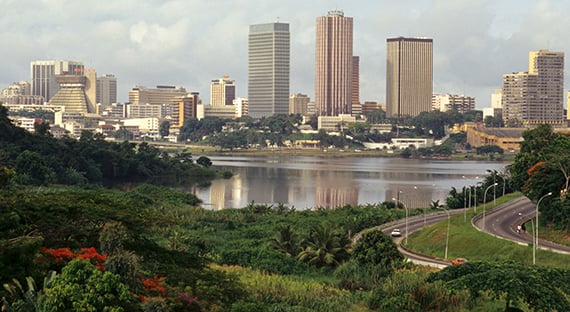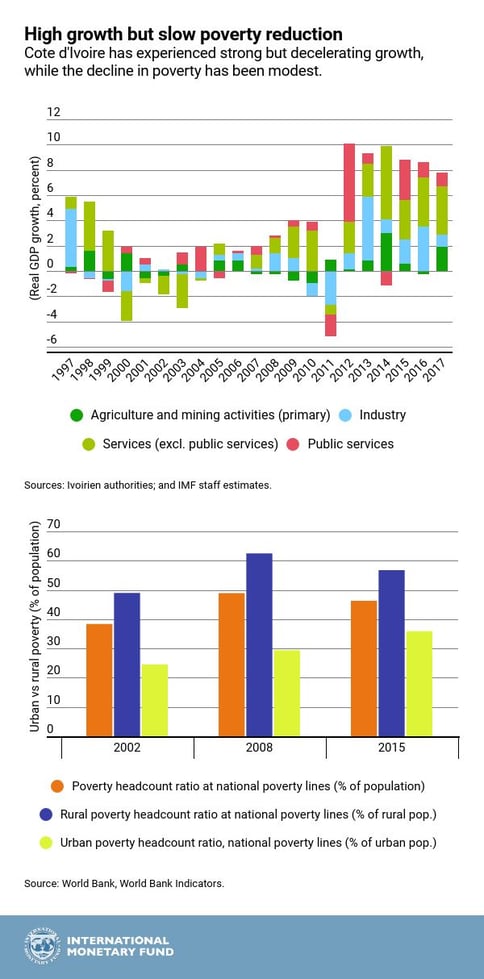
View of Abidjan across a lagoon: To build on its growth momentum and boost inclusiveness, Côte d’Ivoire needs bold structural reforms (Charles O. Cecil/Alamy stock photo)
Cote d'Ivoire: Sustaining Its Economic Transformation
June 30, 2018
The IMF recently completed its annual health check of the Ivoirien economy. Political normalization and good implementation of reforms have contributed to the country’s strong economic performance since 2012. Going forward, bold structural reforms are needed to sustain the pace of development, and ensure that the benefits are shared by all.
Here are some of the report's highlights:
Fast Facts: Cote d’Ivoire
- Population: 24.3 million (2016)
- Capital: Yamoussoukro
- Languages: French (official); 60 other languages, including Baoulé and Dioula
- Currency: West African Communauté Financière Africaine (CFA) franc (XOF)
- Life Expectancy: 51.2 years
- Adult literacy rate: 43.1% (2015)
- Real GDP growth: 8.3% (2016)
- Nominal GDP per capita: US$1,495 (2016)
- Poverty ratio: 46.3% (2015)
-
Sustaining robust and inclusive private sector-driven growth amid
fiscal consolidation is a key policy challenge.
Strong economic performance since 2012 reflected the recovery following the political normalization, improved business environment, sound program of reforms, and supportive fiscal policy. However, these factors may taper over the medium-term, including due to fiscal consolidation, unless bold structural reforms foster more private sector-led growth.
While growth has been impressive, averaging about 9 percent annually, the decline in poverty has been modest and underemployment remains high. The government aims to address this by upgrading public infrastructure, further improving the business climate, and expanding the coverage and targeting of social safety nets.
-
Actions to improve the business climate are gaining momentum, including
in agriculture.
Côte d’Ivoire has made significant progress in reducing processing time for building permits and has introduced a new system for electronic payment of taxes and a credit bureau. There is scope for catching up with sub-Saharan African frontier market countries by improving credit access through stronger legal rights for borrowers and creditors and deeper credit information on borrowers.
Half of the Ivoirien workforce is employed in agriculture, and the majority are from rural areas. About 60 percent of families headed by an agriculture employee are poor. Women account for 40 percent of agricultural workers, and more than half of all the workers are unschooled. Improving the business and regulatory environment for agriculture, which accounted for one-fourth of the growth in 2017, would help boost inclusive growth.
The government is working on improving market access for crops by upgrading transportation infrastructure, extending electricity provision, and developing strategies to enhance value-added from cocoa and cashews.
-
Côte d’Ivoire’s frontier market status, and favorable conditions on the
international capital markets, have expanded financing options but debt
needs to be firmly anchored on a sustainable path.
Sound policies and commitment to reforms have helped the country secure good terms on its Eurobonds issued in 2017 and 2018. External public debt is projected to reach nearly 30 percent of GDP in 2018 and is currently assessed to be sustainable in the medium-term. However, higher reliance on international market financing may raise rollover risks and reduce policy space to buffer future shocks.
-
The Ivoirien government has committed to reduce the budget deficit to
the West African Economic and Monetary Union (WAEMU) ceiling of 3
percent of GDP by 2019.
Côte d’Ivoire is a leading economy in the WAEMU and its fiscal consolidation is critically important for regional macroeconomic and monetary stability, which is essential to foster sustained growth in an environment subject to shocks.
Building fiscal space for priority infrastructure investment and social safety nets require additional revenue mobilization and prioritization of public expenditure. To facilitate public consultation on policies ahead of their introduction and thus improve their implementation, the government has set up a committee that includes private sector representatives to work together on fiscal reforms.
-
Building on past implementation of structural fiscal reforms, the
government is improving revenue administration and public financial
management.
The Ivoirien authorities are upgrading information-sharing protocols across revenue collecting agencies, instituting electronic payment of taxes, improving the tracking of imports, and advancing human resources management and risk analysis. They are improving efficiency of public spending by restructuring public enterprises; modernizing the system of government tenders for acquiring goods and services from private companies; improving fiscal risk management; and upgrading cash management and treasury operations.
-
New prudential rules are reinforcing banking sector stability, but
remaining pockets of vulnerabilities should be addressed.
The country has introduced new prudential rules that are aligned with the 2018 Basel II/III principles, which are designed to reinforce banking sector oversight and market discipline. These include higher minimum capital adequacy requirements and stricter loan concentration requirements. Stringent application of prudential rules for the few remaining noncompliant banks would further improve the soundness of the banking system.



